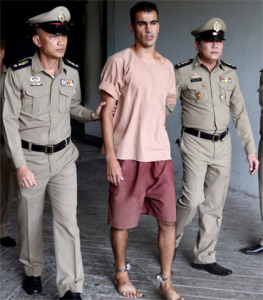Rogues states inflicting repression across borders
Repressive authoritarian regimes are increasingly resorting to trans-national kidnappings and killings to preserve their power and suppress opposition and criticism at home, according to a new report.
Human Rights group Freedom House have released a report that has catalogued 608 cases of physical repression committed foreign states since 2014.
 The report, titled ‘Out of Sight, Not out of Reach: The Global Scale and Scope of Transnational Repression’, says transnational assassinations and kidnappings are not sporadic events.
The report, titled ‘Out of Sight, Not out of Reach: The Global Scale and Scope of Transnational Repression’, says transnational assassinations and kidnappings are not sporadic events.
“They manifest a recurring pattern of transnational repression used by authoritarian and strongman states,” the report says.
The report found that influential authoritarian regimes including Russia, Turkey, Saudi Arabia, Iran and China, as well as less influential Burundi and Egypt, used “digital threats, spyware, and coercion by proxy, such as the imprisonment of exiles’ families” to intimidate and repress opponents”.
It said transnational repression is becoming a “normal” phenomenon.
“The global review identified more governments, using the same tools, in more incidents than is typically understood. The states that run transnational repression campaigns deploy a broad spectrum of tactics against their perceived enemies, from spyware and family intimidation to renditions or assassinations,” the report said.
It said most physical transnational repression involves co-opting host governments in order to reach exiles.
“The most common forms of transnational repression— detentions and unlawful deportations at the origin state’s request—entail exploitation of the host country’s institutions,” the report said.
“Most renditions also involve working closely with host country authorities to illegally transfer people to the origin country. In this way, transnational repression directly undermines the rule of law in the targeted host country,” it said.
The report said stopping transnational repression will require re-establishing international norms that support universal due process and punish extraterritorial violence.
The report outlines several high-profile cases.
In May this year, exiled Belarusian dissident journalist Roman Protasevich boarded a flight in Greece headed for his temporary home in Lithuania – a popular destination for exiled Belarusians
While over Belarusian airspace, a fighter jet intercepted and diverted the Ryanair airliner and forced it to make an emergency landing in Minsk where Belarusian authorities claimed there was a bomb on the plane and arrested Protasevich was arrested.
In 2020, Rwandan opposition figure Paul Rusesabagin, a critic of Rwandan President Paul Kagame and the man who inspired the film Hotel Rwanda, boarded a flight in Chicago bound for Burundi.
While in transit in Dubai, he boarded a private jet owned by a Greek company believing he was bound for Burundi. But when the plane landed, he found he was in Rwanda, a country he had vowed never to return to. Mr Rusesabagina is currently facing terrorism charges in Kigali.
Other cases outlined include the story former Russian spy Sergei Skripal and his daughter Yulia who were poisoned with nerve agents in 2018, reportedly by Russian agents, although President Vladimir denies this.
And in the same year, the horrific details of the murder of Saudi journalist Jamal Khashoggi shocked the world. The critic of the Saudi regime was lured to the Saudi consulate in Istanbul where he was suffocated and his body dismembered.
The year before, Kim Jong-nam, half-brother to North Korean dictator Kim Jong-un, was smeared with a deadly chemical agent in a Malaysian airport.
The report also slams the abuse of Interpol red notices, issued to locate fugitives across the world.
Interpol is an inter-governmental organisation that facilitates worldwide police collaboration between nation states, repressive regimes included, to tackle transnational crime.
It does not have any power to issue warrants, and it has few resources to vet the veracity of red notices which are provided at the direction of its members.
In 2018, an Australian political refugee of Bahraini descent, footballer Hakeem al-Araibi, was arrested in Thailand where he had arrived on his honeymoon.
The arrest was made based on an Interpol notice issued by Bahrain, and Thai authorities were set to deport him to Bahrain but after a campaign by the Australian public and sporting community, he was allowed to return to Melbourne.
The report calls on the US and other democracies to deploy a robust strategy for the use of targeted sanctions against perpetrators of transnational repression and those facilitating such acts; and also to maintain “robust refugee resettlement programs to protect victims of transnational repression and others fleeing persecution”.
It calls on civil society organisations to invest in “digital hygiene” trainings among targeted communities.
“The networked nature of digital organizing and digital communications means that penetration at one point can affect an entire community. Where the community includes refugees, digital hygiene should be integrated into refugee resettlement programs,” the report said.
It also calls on NGOs to engage with law enforcement institutions that may encounter transnational repression in their work to provide briefings, educational introductions to help law enforcement institutions to better understand the problem.
See the full report here: https://freedomhouse.org/sites/default/files/2021-01/FH_TransnationalRepressionReport2021_rev012521_web.pdf












